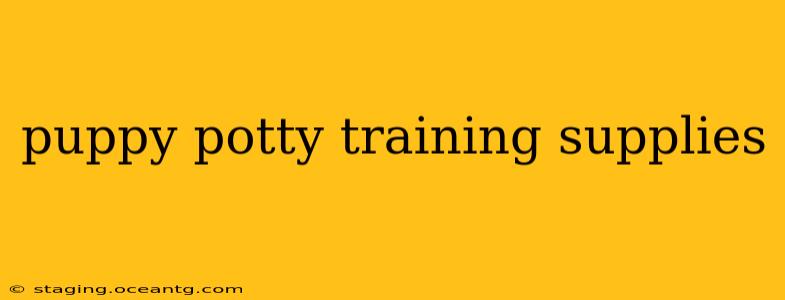Bringing home a new puppy is an exciting time, filled with playful cuddles and adorable antics. However, puppy potty training is a crucial aspect of responsible pet ownership, and having the right supplies can make all the difference. This guide will equip you with the knowledge and tools to navigate this essential phase successfully. We'll cover everything from essential items to helpful extras, answering common questions along the way.
What are the essential puppy potty training supplies?
The core of successful potty training revolves around a few key supplies. These aren't luxury items; they're the foundation upon which your training plan will be built.
-
Enzyme Cleaner: Accidents happen. Regular cleaners simply mask the odor; enzyme cleaners break down the odor-causing molecules, preventing your puppy from returning to the same spot. This is a MUST-have to avoid reinforcing accidents.
-
High-Quality Puppy Food: A balanced diet contributes to regular bowel movements, making potty training more predictable.
-
Designated Potty Area: This could be a patch of grass, puppy pads, or even a designated corner of your yard. Consistency is key; always take your puppy to the same spot.
-
Plenty of Positive Reinforcement: Treats, praise, and toys are your weapons of choice! Positive reinforcement is far more effective than punishment.
-
Durable Leash & Collar: For supervised potty breaks, especially outdoors, a leash and collar ensure your puppy's safety and prevent escape attempts.
What kind of puppy pads should I use?
Choosing the right puppy pads is important. Look for pads that are:
- Absorbent: They should effectively soak up urine and prevent leakage.
- Odor-Control: Similar to enzyme cleaner, odor control prevents your puppy from being drawn back to the same spot.
- Large Enough: Select a size that allows your puppy ample space. Consider larger pads as your puppy grows.
Avoid scented pads, as the fragrances might irritate your puppy's sensitive nose.
How often should I take my puppy outside to potty?
This depends on the puppy's age and breed, but here's a general guideline:
- Puppies under 4 months: Every 2-3 hours, immediately after waking up, after playing, and after eating or drinking.
- Puppies over 4 months: Gradually increase the intervals between potty breaks, but still maintain frequent trips, especially after meals and sleep.
What are some helpful potty training aids?
Beyond the essentials, several additional supplies can streamline the process:
-
Potty Training Bells: Attach bells to a door or designated potty area. Teach your puppy to ring the bells when they need to go out. This encourages communication and independence.
-
Puppy Gates: These can confine your puppy to a small, easily cleanable area while you're not directly supervising them, preventing accidents.
-
Waterproof Covers/Mats: Protecting your floors from accidents is essential, especially in the early stages.
How can I deal with accidents?
Accidents are a normal part of potty training. The key is to react calmly and effectively:
- Clean immediately: Use your enzyme cleaner thoroughly.
- Don't punish your puppy: Punishment can create fear and anxiety, hindering the learning process.
- Increase the frequency of potty breaks: This can help prevent future accidents.
Remember, patience and consistency are your greatest allies in puppy potty training.
What if my puppy keeps having accidents in the house?
If accidents persist despite your efforts, consider these possibilities:
- Underlying medical condition: Consult your veterinarian to rule out any medical issues affecting bladder control.
- Insufficient potty breaks: Are you taking your puppy out often enough?
- Inconsistency in training: Ensure everyone in the household is using the same training methods.
- Stress or anxiety: Changes in routine, new environments, or the presence of other pets can affect a puppy's potty habits.
By utilizing these supplies and following consistent training techniques, you'll successfully guide your puppy through this important developmental phase, creating a happy and well-adjusted companion. Remember, consistency, patience, and positive reinforcement are the keys to success!
